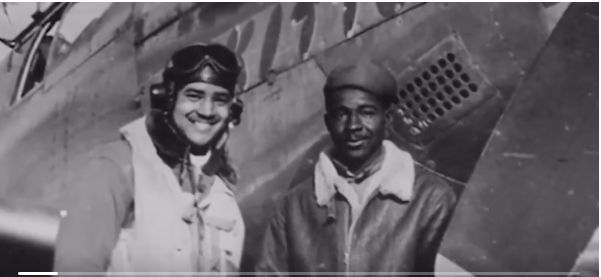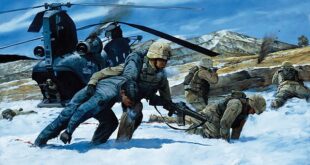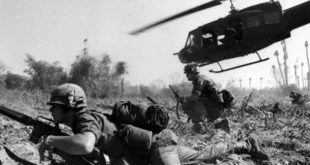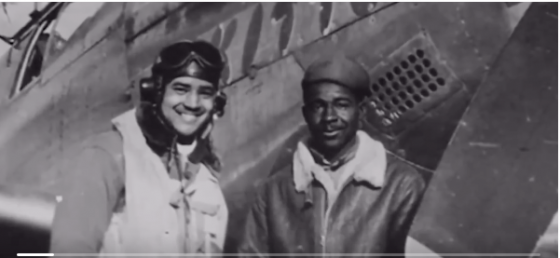
Retired Brigadier General Charles McGee, has died at the age of 102.
Tuskegee Airman Recalls WWII Service, Calls Freedom Key to Opportunity
NOV. 10, 2021 | BY C. TODD LOPEZ, DOD NEWS
Tuskegee Airman Recalls WWII Service, Calls Freedom Key to Opportunity
In March 1942, college student Charles McGee was studying engineering at the University of Illinois in Champaign. Less than four months prior, the Japanese had bombed Pearl Harbor in Hawaii, and the U.S. was at war.
“In ROTC I learned to handle a rifle pretty well,” he said. “But because I was in school, my draft board wasn’t pulling my number.”
McGee figured it couldn’t last long; the draft wouldn’t come after him, especially as things heated up in Europe.
“Had they, I would have probably been on the ground with that rifle,” he said.
In nearby Rantoul, Illinois, McGee said he learned the Army Air Corps had set up a training school for Black aircraft mechanics on Chanute Air Field.
“I was in school [at the] university 14 miles away — and that’s really where I learned about the program,” he said. “The Army policy was they couldn’t use [Black] pilots because they had no Black mechanics.”
The Army training Black aircraft mechanics meant the Army was also looking for Black pilots as well, McGee figured — something which interested him more than the prospect of being a ground-pounder with a rifle.
McGee opted to get involved in something that interested him, and soon found himself in Tuskegee, Alabama, learning to fly military aircraft.
“I heard about the aviation opportunity and passed the exams,” he said. “[After] my first flight in a PT-17 — to be able to go up there and loop roll and spin and come back and put your feet on the ground — I was hooked! Never have I forgotten that first day.”
McGee ended up flying in World War II for the Army as part of what are now called the Tuskegee Airmen — a group of Black pilots and ground personnel with a remarkable service record during the war.
“I served in the Mediterranean theater in WWII in the 302nd Squadron of the 332nd Fighter Group,” he said. “We went directly to Italy in the spring of 1944, and I served almost a year because I ended my time there in November.”
In Europe, he said, one of his proudest missions involved providing an escort for aircraft that would repatriate hundreds of downed crewmen who were being protected from the Germans by the Yugoslavians.
“It was just wonderful to realize that the hundreds of Americans were able to get back home,” he said.
The second world war ended in 1945, and shortly after, in 1947, the U.S. Air Force was created from the Army Air Corps. McGee stayed on and became part of the new service.
It was around that time, he said, the U.S. armed forces began to integrate — and the Air Force was the first to make it happen. Another war would speed things up for the services who were dragging their heels.
“The Navy and the Army were pretty slow,” he said. “Well, they really got on board in the Korean timeframe. But the Air Force led our country in providing equal access and equal opportunity for all.”
McGee served in WWII, the Korean War and Vietnam, and flew more than 400 combat missions across all three wars. He also earned a Distinguished Flying Cross while serving in Korea — it was one of his proudest moments, he said. He retired from service in 1973 as an Air Force colonel, and in 2007 was, along with other Tuskegee Airmen, awarded the Congressional Gold Medal. In February of last year, President Trump promoted McGee to brigadier general.
In WWII, McGee and other pilots who were part of the Tuskegee Airmen had broken down barriers for the Black service members who would follow. But he said he and the others didn’t see it that way when they were training or flying missions.
“We didn’t go south to say we’re going to go set the world on fire,” he said. “For some it was an opportunity that they had always wanted — they saw an airplane when they were little, or had a ride and wanted to do that. They were there for that. For myself, or [the] country to come out of 10 years of depression, the declaration of war to support our allies in Europe — it didn’t change segregation, but it changed opportunity. The need opened that door.”
While McGee said he didn’t think about changing the world when he chose to go fly for the Army, two things he was thinking about were freedom and opportunity.
“What freedom means to me is the fact that although there were those who said I couldn’t do something because of my happenstance of birth,” he said. “Freedom provided the opportunity to serve and prove that it’s not just an idea for somebody to tell you can’t do something — it also requires the endeavor from yourself, that yes I can. And it’s in freedom that you get the opportunity to prove that you have abilities. They can be developed to not only help you as an individual, but what it means in the area of business, jobs and opportunities — you can’t beat it. Freedom is the key to providing such opportunity for one and all.”
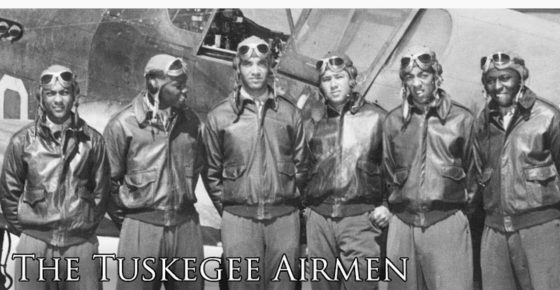
Now more than 100 years old, McGee talks today with a lot of young people at schools and other public-speaking events. To emulate his success, he said, he’s got a formula he calls “the four Ps,” something he said works equally well for adults.
“Perceive, dream your dreams,” he said. “Find out what your talents are. And I like to add, and hopefully among them is something you really enjoy doing, as I enjoyed my flying experiences.”
Preparation is also important, he said. And that means getting a good education.
“Learn to read, write and speak well, and develop those talents,” he said. “Unfortunately, all of our youngsters aren’t getting that opportunity.”
Once you’ve set a goal for yourself, he said, and you’ve gotten the education for how to do it, it’s all about doing it and doing it well. Performance matter, he said.
“Always do your best with excellence as your goal in everything you do — that’s good for you,” he said. “What you do good that way is good for your family, what’s good for your family is good for our community, [and] what’s good for the community is good for the country.”
And finally, he said, is perseverance — pressing on even when there is something pushing back.
“Don’t let circumstances of folks telling you you can’t do something be an excuse for not achieving,” he said. “We could have gone off, bowed our heads, and said they called me names and they don’t like me and don’t want me and not served our country.
But look at what that would have meant, what we did accomplish.”
Perhaps a fifth “P,” not included in his four, is “patriotism” — which McGee has quite a bit of.
“America is the greatest nation on Earth because of the values that we like to sustain,” he said. “Some of them aren’t always supported by everybody around the country. But the fact that the chance for opportunity is there — and of course you have to prepare. A good education program is very important — there’s more than one step for that accomplishment. … We adults need to mentor the young folks because they are our country’s future. And there are many things out there they don’t need to get into, but there are many things they do need to, to keep America the greatest.”Spotlight: Honoring Our Veterans
NOV. 10, 2021 | BY C. TODD LOPEZ
Tuskegee Airman receives promotion to brigadier general
By Staff Sgt. Jeremy L. Mosier,
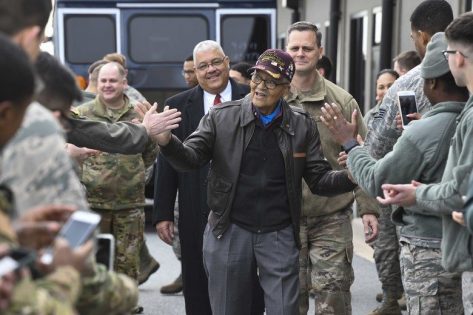
Tuskegee Airman receives promotion to brigadier general
By Staff Sgt. Jeremy L. Mosier,
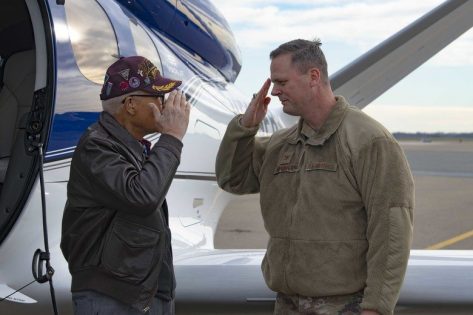
Celebrating a 100th birthday is monumental in itself, but for retired Col. Charles E. McGee, shortly after this celebration he would reach yet another milestone in his successful career.
On Feb. 4, he found himself in the Oval Office at the White House being promoted to brigadier general by President Donald Trump.
“At first I would say ‘wow,’ but looking back, it would have been nice to have had that during active duty, but it didn’t happen that way,” McGee said. “But still, the recognition of what was accomplished, certainly, I am pleased and proud to receive that recognition and hopefully it will help me carry on as we try to motivate our youth in aviation and space career opportunities.”
McGee’s successes started early on in his career, when on June 30, 1943, he earned his pilot’s wings as one of the Tuskegee Airmen, the decorated unit of African American Airmen famous for not only their combat successes, but the impact they had on the cultural shift in the military.
His military career spanned across three decades, where he flew 409 combat missions during three different wars – WWII, Korean War and Vietnam War. While serving, McGee was presented with the Distinguished Flying Cross, Legion of Merit, Bronze Star, Air Medal and the Presidential Unit Citation.
After he retired in 1973, McGee has continued to leave his mark in history. In 2007, he was presented the Congressional Gold Medal by former president George W. Bush, and in 2011, he was enshrined in the National Aviation Hall of Fame. Then in 2019, the Tuskegee Airmen’s legacy was cemented in the naming of the T-7A training aircraft, the “Red Hawk,” in a tribute to the airplane they flew.
“Charles McGee is a genuine American hero whose courage in combat helped save a nation, and whose legacy is felt to this day across the entire U.S. Air Force,” said Air Force Chief of Staff Gen. David L. Goldfein. “It was an honor to witness his promotion and to thank him yet again for paving the way for today’s Air Force. The Tuskegee Airmen continue to inspire generations of Americans.”
The evening after he was promoted, McGee attended the State of the Union as a guest and was recognized by Trump. “General McGee, our nation salutes you. Thank you, sir,” Trump said.
Trump wasn’t the only one to recognize McGee this week; on Sunday McGee, along with three other veterans, each 100 years of age, participated in the coin toss at the Super Bowl in Miami.
He has credited all these achievements to a simple formula.
“I’d like to pass on what I call my four ‘P’s’ — perceive, prepare, perform, persevere — dream your dreams but get the good education to accomplish the desires and needs of the country,” he said. “Always seek excellence and always do your best in things that you do. Finally, don’t let the negative circumstances be an excuse for not achieving.”
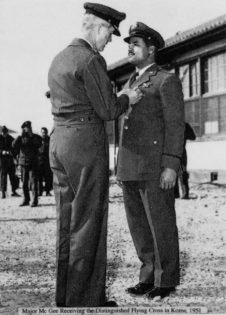
In December 2019, Tuskegee Airman Charles McGee was given an honorary promotion from Colonel to Brigadier General. Gen McGee was a special guest at the 2020 State of the Union Address on February 4, and the president pinned his stars in the oval office earlier that day. See Video Below
Below: Charles McGee Brigadier General and his great-grandson, Iain Lanphier attended the State of the Union Address. Video Below
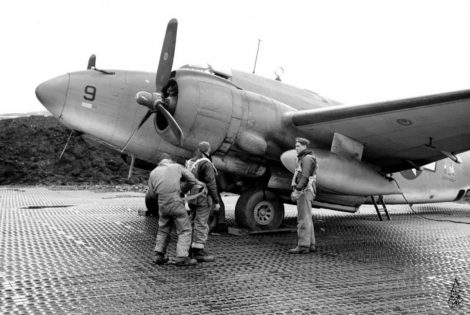
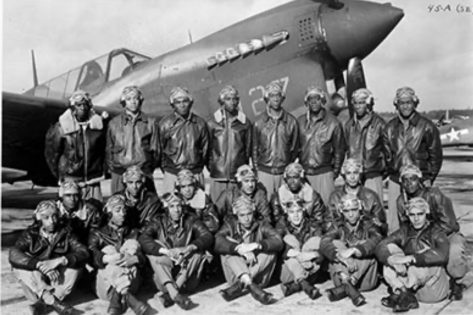
 Soldier of Fortune Magazine The Journal of Professional Adventurers
Soldier of Fortune Magazine The Journal of Professional Adventurers


